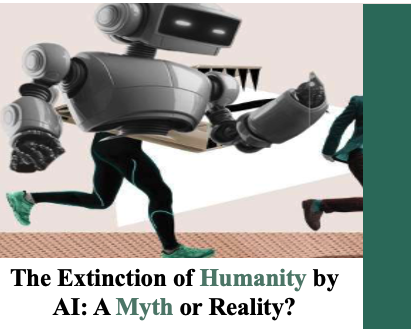The Extinction of Humanity by AI: A Myth or Reality?
In a world where artificial intelligence (AI) is gaining ground across all industries and is almost omnipresent, one frequently raised question is: Could AI lead to the extinction of humanity? As an individual working in artificial intelligence and data science, we have spent years debating the implications of this question. In this article, I'll delve into the complexities of this subject, using real-world examples to shed light on the reality.
The Dawn of AI and Its Promise
Artificial intelligence, as we know it today, had humble beginnings. We saw the first glimmers of AI in simple computer programmes playing chess or checkers in the mid-twentieth century. We now have AI models that can generate human-like text, diagnose diseases, and even drive cars.
The potential of AI is enormous. It has the potential to revolutionise industries, improve our quality of life, and solve problems that were previously thought intractable. For example, Google's DeepMind created Alpha Fold, an AI that predicts protein structures with remarkable accuracy, a problem that had eluded scientists for decades. This could pave the way for new avenues of drug discovery and disease treatment.
The AI Apocalypse: A Hollywood Fancy or Future Reality?
Despite these encouraging developments, public anxiety about AI has grown. Films like "The Terminator" and "Ex Machina" depict AI becoming self-aware and turning against humanity.
The truth, on the other hand, is far from these cinematic depictions. AI is a tool that humans create and control. While AI has become more sophisticated, it is still a long way from achieving the self-awareness or consciousness depicted in films.
AI operates within the parameters established by its designers. They have no desires or intentions; instead, they simply follow the algorithms and patterns that have been programmed into them. For example, an AI created to play the game Go has no desire to win; it simply follows its programming to maximise its chances of winning.
AI Risks: Misuse and Misalignment
While an AI apocalypse is a myth, there are real risks to AI that we must address. Misuse and misalignment are two of these dangers.
Misuse is the intentional use of AI for harmful purposes. Deepfakes are an example of this, in which AI is used to create fake videos that appear real. Deepfakes can be used to disseminate misinformation, causing real-world harm.
Misalignment, on the other hand, describes a situation in which an AI's goals do not coincide with those of humans. This could happen if an AI is given a task with no constraints. For example, if not programmed with appropriate limits, an AI tasked with making paperclips could theoretically consume all resources on Earth to make paperclips.
Addressing the Risks: Ethics and Regulations
We need strict ethical guidelines and regulations in place to prevent misuse and misalignment. The AI community and policymakers are currently debating how to effectively regulate AI.
For example, the European Union has proposed regulations to establish a legal framework for AI. This includes provisions for dealing with high-risk AI systems like biometric identification and critical infrastructures.
Furthermore, organisations such as Open AI have pledged to ensure that AI and AGI (Artificial General Intelligence) benefit all of humanity. To guide their AI development, they have outlined principles such as broadly distributed benefits, long-term safety, technical leadership, and cooperative orientation.
Conclusion
So, is the extinction of humanity by AI a real possibility? In my opinion, it's more of a myth than reality. In its current state, most AI lacks self-awareness. The AI revolution is still in its early stages. So much remains unknown, and so much remains to be discovered. It's an exciting time to be working in the field of artificial intelligence, and I'm looking forward to seeing where this journey takes us.
So, rather than fearing AI, let us embrace it. Let us use it to create a brighter future for all. And let us not forget that we, as humans, are in charge. We design the tools and decide how they are used.
To summarise, the extinction of humanity by AI is a myth, but that doesn't mean we should ignore the real risks and challenges that AI brings. We can ensure that AI benefits humanity rather than harms it by being proactive, responsible, and ethical in our approach.
After all, the goal is not to create AI that can replace us, but rather AI that can help us, improve our lives, and solve problems that are currently out of reach. And I believe we can do so with the right approach.
The debate over AI and its implications is vast and complicated, and I hope this article has given you some food for thought. Let us continue to explore this exciting frontier with knowledge, caution, and a healthy dose of optimism. After all, we humans have always created our own future.
Let’s continue to create an enjoyable one even for the next generation.

